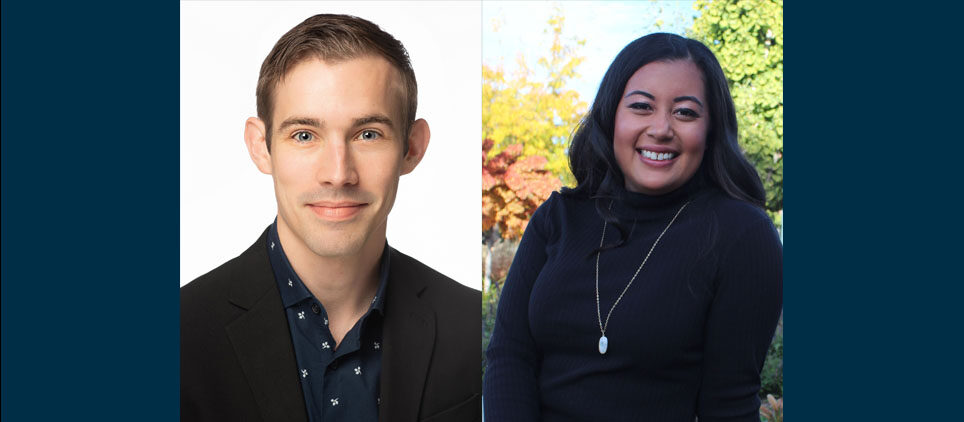SBS students awarded prestigious American Heart Association fellowships

- March 16, 2023
- By: Matt Havlik
- Research
Austin Davis and Selina Tucker, both Ph.D. candidates in The University of North Texas Health Science Center at Fort Worth’s School of Biomedical Sciences, were awarded two-year predoctoral fellowships from the American Heart Association.
AHA grants predoctoral fellowships to enhance the research and clinical training of promising students pursuing careers aimed at improving global cardiovascular, cerebrovascular and brain health.
The fellowships will help Davis and Tucker continue research projects in pursuit of their doctoral degrees at HSC.
“Fellowships like this one recognize the quality of the student’s research accomplishments and potential for future success at the national level,” said Johnathan Tune, Ph.D., chair and professor of Physiology and Anatomy at HSC.
Tucker’s project aims to understand how blood and oxygen levels to the heart change in mothers who have recently given birth. Findings could help improve treatments that reduce the risk of death in new mothers. Tucker works under the mentorship of Tune.
“The U.S. leads developed countries in the number of maternal deaths every year,” Tucker said. “Of the deaths occurring during or immediately following delivery, a large percentage are due to complications in the cardiovascular system.
“Research projects like mine will broaden the now limited understanding of the cardiac changes a woman’s heart undergoes during this dynamic time period. With increased understanding comes clinical practice recommendations to protect these women and their children.”
Davis’ project explores new ways to treat blood loss in people who have experienced traumatic injuries, a leading cause of death globally. His research will look at how fluctuations in arterial pressure and blood flow protect the brain and other vital organs during severe blood loss. Davis works under the mentorship of Caroline Rickards, Ph.D., associate professor of Physiology and Anatomy.
“Even with current treatments, nearly 50,000 people die per year in the U.S. from injuries which cause blood loss,” Davis said. “The findings of my study may be early evidence for the use of blood pressure fluctuations as an additional treatment for severe blood loss.
“The results of this study could show that this technique may be relevant for the treatment of any condition which reduces blood flow to vital organs such as heart disease, stroke and sepsis.”
HSC and the School of Biomedical Sciences provide beneficial support for students throughout the grant process. Ph.D. students take a course on grant writing that teaches them how to write competitive grant applications and understand how grant reviews work. A new incentive program in SBS also encourages students to apply for individual fellowships.
The experience and guidance of SBS faculty mentors significantly influence the grant process as well.
“Our mentors play a large role in reviewing our grant proposal as they are the content experts for the research we are proposing and have their own experiences applying for grants which aids in making the application more competitive,” Davis said.
Davis said earning an independent grant as a Ph.D. student is a major milestone that could help with future funding throughout his career.
“This is the best kind of award we can put on our CVs within our Ph.D. training,” he said. “It helps us gain the valuable experience of simply applying for grants, which is a huge undertaking in itself.”
Davis’ lab is currently recruiting participants in their research projects. If you are interested in contributing to medical research, you can contact Austin Davis.


![Uyen Sa Nguyen Scaled[58]](https://www.unthsc.edu/newsroom/wp-content/uploads/sites/16/Uyen-Sa-Nguyen-scaled58-145x175.jpg)


Social media